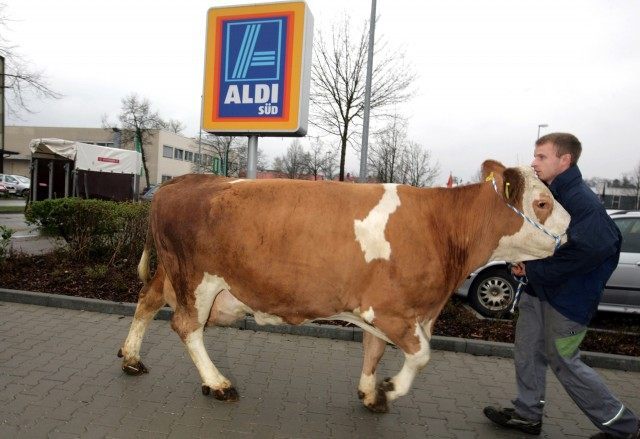A former milk magnate has poured scorn on recent campaigns by farmers to drive up the price of supermarket-sold milk. He says global over-production and reduced demand are to blame for falling profits, not supermarkets, which are ironically among the farmers’ best paying customers.
Writing in the Telegraph, Neil Davidson dismissed recent campaigns by farmers, including the “Milk Trolley Challenge,” which involves farmers emptying supermarket shelves of milk, and “parading slogan bedecked cows through stores” as mere “periodic spats” which have become commonplace with supermarkets over the last decade or so.
Davidson, who is the former chief executive of both Arla Foods and Express Dairies, and holds a CBE for services to the dairy industry, said the campaigns may be good at “catching the attention of the media”, but were ultimately “bound to fail” as the “analysis of the problem is flawed”.
Only in #Devon Yesterday was interesting #MilkTrolleyChallenge pic.twitter.com/O6ZfH7XM6J
— Elliot Horwood #44 (@ElliotHorwoodF1) August 10, 2015
Understanding that the public is not aware of global over-production in the milk industry, he believes a good comparison can be made with oil, which the public do understand.
“Both are tough industries and both are international markets that are hugely influenced by a combination of global over-production and reduced demand, which have had an adverse impact on UK producers in the past year,” he said.
But while “many people are familiar with the Brent Crude oil index,” they are “less so with dairy equivalents such as the GlobalDairyTrade series.” Both of these have fallen by more than 60 percent in the last 18 months, Davidson said.
In fact, the plummet in milk prices had been forecast in April when the EU scrapped its 30 year old milk production quota, allowing farmers to sell as much as they liked. Romuald Schaber, president of the European Milk Board, cautioned it was “inevitable” a boom in production would cause “chronic price collapses” as farms across Europe leapt to compete for global business.
And Rob Harrison, the National Farmers Union’s dairy board chairman said, “Farmers and dairy processors here do have some concerns about how other EU countries will react to the ending of quotas. Some are rapidly increasing their output without an end market for these goods.”
Davidson pointed out: “In oil, a fall in the index creates an expectation of consumer benefit. If there is public concern, it is about how quickly and to what extent price cuts are passed on “at the pump”.
“With milk, while there is a vague understanding of global over-production, the predominant public perception is one of farmers being ill-treated by powerful supermarkets engaged in a price war. Certainly, there is no expectation of benefits to consumers as a result of falling global dairy prices. Public opinion is informed by farmer reaction – protests at supermarket depots and stores, cost of production arguments and price comparisons with bottled water.”
It is a perception that is hurting, not helping the dairy industry.
“Supermarkets buy less than 25pc of UK milk output and collectively these retailers pay farmers the highest prices relative to the rest of the market. Because of historical protests, these prices are already the most loosely connected to global downturns. Farmers are therefore attacking their best-paying customers. If successful, their actions will only benefit the farmer groups who supply these supermarkets.”
Rather, the bigger issue is with the 50 per cent of the market that goes to longer life products including cheese, butter and milk powder. The price of butter has dropped from £3,400 a tonne in January 2014 to £2,000 a tonne today, according to Davidson. “That price drop is due simply to global supply and demand issues that have nothing whatsoever to do with supermarkets,” he said.
A downturn in demand from Russia, China and the EU coupled with a global increase in milk output as yields rise, and currency factors are what is really driving the profits squeeze. But whereas in the oil industry jobs are laid off to help companies weather the downturn, in the milk industry, which is predominantly made up of sole traders, farmers have reacted by driving up yields, further exacerbating the problem.
“Some estimates suggest that 5,500 North Sea jobs have been lost in the last year with the possibility of another 23,000 to go before 2020.
“In dairy, with the majority of farmers sole traders, the rational short-term response has been to produce more milk to secure marginal income. UK milk production is currently 3.9 percent up on last year (and Ireland it is up a staggering 13 percent),” Davidson notes.
Davidson believes that the answer lies not in government advertising slogans such as “Buy British”, which in the past have only provided short term solutions while landing the industry in trouble with the competition authorities.
Rather, what is needed is a long term restructuring of the industry. “The obvious answer is to reduce exposure to international commodity markets by producing less milk.
“We have strong domestic markets for fresh milk, fresh dairy products and branded cheese, with limited threats of imports. An annual output level of around 11bn litres would satisfy these markets.”
He cites data from the Agriculture and Horticulture Development Board which suggests that there are still a number of inefficient producers in the system, who he says should “consider their future in the industry.”
He concludes: “If redundant oil workers blockaded refineries and petrol forecourts demanding a special North Sea price based on production costs, they would soon get short shrift from consumers.”

COMMENTS
Please let us know if you're having issues with commenting.